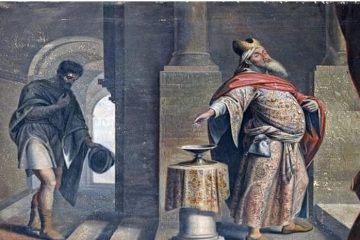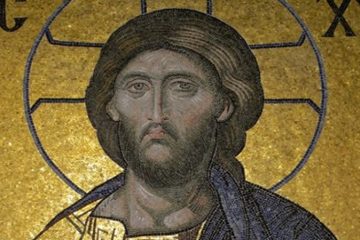Archimandrite Georgios Kapsanis, Abbot of the Holy Monastery of Gregoriou †
The immediate fruit of God’s love is the love of the image of God, that of people and all God’s creatures. Through years of ascetic effort, monastics acquire a ‘merciful heart’, which loves as God does. According to Abba Isaak the Syrian, a merciful heart is ‘a heart burning on behalf of the whole of creation, that is people, birds, animals, demons and every other creature, at the remembrance or sight of which the eyes shed tears and, from so much fellow-suffering and mercy, the heart of the merciful person recoils and is unable to bear or hear of any hurt or any sorrow that has been dealt to creation. This is why such people pray with tears and at every hour, even for irrational animals, for the enemies of truth, for those who do them harm, that God will preserve them and have mercy upon them. They also pray for reptiles out of the excess of mercy which flows beyond measure in their hearts (Discourse 81).
In the Gerontikon (the Collection of the Sayings and Works of the Desert Fathers), we encounter figures of sacrifice and love, who recall and manifest the love of Christ. Abba Agathon used to say that he wished he could find a leper and assume his body. ‘Perfect love, do you see?’ comments Abba Isaak the Syrian.
Moreover, the organization of a coenobitic monastery is founded on love, on the model of the first Christian communities in Jerusalem. Like the Lord with His twelve apostles, and like the first Christians, monastics have in common their possessions and their lives in Christ. The abbot owns no more than a young novice. Nobody has any money to dispense as they wish, except what they receive as a blessing from the abbot for a particular need.
Common ownership, equality, fairness, mutual respect and the sacrifice of one for all and all for one elevates life in a coenobium to the realm of real love and freedom. Those who’ve lived even for just a few days in a real coenobium know the grace there is in the mutual love between members of the community and how much this relieves souls. You feel as if you’re living with the sons of angels.
The organizer of the coenobium system, Basil the Great, speaks pointedly of the love in Christ that abounds in monasteries: ‘What can be compared to this style of life? Is there anything more blessed? What’s more true than conjunction and union? Or more civilized than a mingling of characters and souls? People start out from various countries and from different races and adapt to life together in one place, with such punctiliousness that they seem to be one soul in many bodies and instruments with one and the same voice. Those with a bodily illness have others to suffer alongside them. Those of a sick disposition who are weak in the soul, have many others to cure them and to correct them. Each of them is a servant to the others, each is master of the others and all, with unassailable freedom, vie with each other to be the most punctilious in their duties. These duties do not force any great discord, nor do they cause anxiety among those in charge, but rather have been created from a free expression of opinion. Love makes those who are free subject to one another, and ensures freedom by the individual choice of each person. This is how God wanted us initially and this is why He created us. Monastics render again our ancient beauty, because they remedy the sin of our forefather Adam, since there would be no division, no estrangement, no war, had sin not rent our nature in twain. They therefore imitate the Saviour and His incarnate life. Just as He, for example, when He assembled His group of disciples, made everything to be held in common by the Apostles, even themselves, so monastics- those who observe the life carefully, of course- in their obedience to the Abbot, imitate precisely the life of the Apostles and the Lord. They envy the life of the angels, because they observe carefully the common life of the latter. Among the angels there’s no strife, no discord nor doubt: everything belongs to each one, and all of them store up for themselves the blessings of all’ (Ascetic Ordinances, 18, 2).
In coenobia, monastics can experience apostolically and purely the mystery of the Church, as a mystery of communion and union of God and people, they can experience the unity of faith and the communion of the Holy Spirit, which is the desire of all Christians. They know from experience that the Church isn’t a religious foundation or an institution, but a community in Christ, the Body of Christ, the Assembly of the formerly scattered children of God (Jn. 11, 52), their family in Christ. This ecclesiological experience gives monastics the opportunity to see their fellows as members of the same body and to honour them as they would Christ. This is the explanation for the generous hospitality offered to pilgrims and visitors, and the continuous, tearful prayer on behalf of living and departed fellows, known and unknown.
Monastics fulfill their love for people in the world in different ways, such as the refreshment of the soul and spiritual support which they provide. Many people who are burdened and weary in soul have recourse to monasteries, and particularly the Holy Mountain, in order to find peace for their souls with Elders and Spiritual Fathers who have already found peace with God. And it’s not at all unusual for experienced Athonite spiritual fathers to go out into the world, to relieve other Christians and to support them in the faith.
Read the previous posts here (part 1, part 2)
Source: pemptousia.com
ABOUT THE ORTHODOX CHRISTIAN NETWORK
Orthodox Christian Network (OCN) is a 501(c)3 and an official agency of the Assembly of Canonical Bishops of the United States of America . It is a recognized leader in the Orthodox Media field and has sustained consistent growth over twenty-two years. We have worked to create a community for both believers and non believers alike by sharing the timeless faith of Orthodoxy with the contemporary world through modern media. We are on a mission to inspire Orthodox Christians Worldwide. Click to signup to receive weekly newsletter.
Join us in our Media Ministry Missions! Help us bring the Orthodox Faith to the fingertips of Orthodox Christians worldwide! Your gift today will helps us produce and provide unlimited access to Orthodox faith-inspiring programming, services and community. Don’t wait. Share the Love of Orthodoxy Today!
OCN has partnered with Pemptousia. A Contemporary post-modern man does not understand what man is. Through its presence in the internet world, Pemptousia, with its spirit of respect for beauty that characterizes it, wishes to contribute to the presentation of a better meaning of life for man, to the search for the ontological dimension of man, and to the awareness of the unfathomable mystery of man who is always in Christ in the process of becoming, of man who is in the image of divine beauty. And the beauty of man springs from the beauty of the Triune God. In the end, “beauty will save the world”.




0 Comments